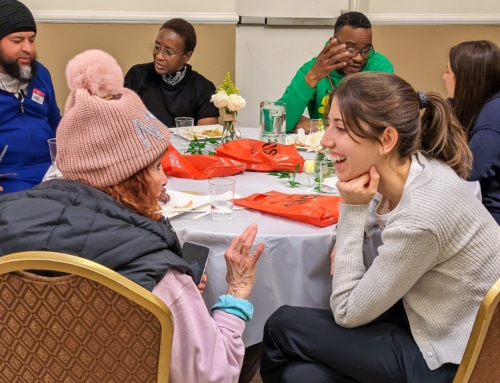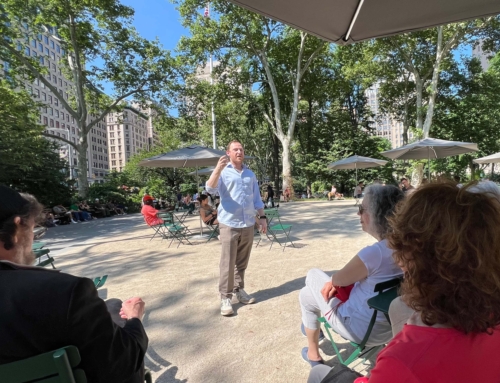Tisha B’Av is the saddest day on the Jewish calendar. It is a time for mourning for the destruction of the Temples and other disasters that have befallen the Jewish people.
Join Adereth El this Tisha B’Av on Saturday night, July 21st, and Sunday, July 22nd, for a truly moving and meaningful service.
Led by Rabbi Gideon Shloush, Saturday night’s program will include the reading of the Book of Eicha (Lamentations), recitation of Kinot (reflective poetry), and an inspiring Kumzitz (spiritually-moving songs).
On Tisha B’Av Fast day, Sunday services (8:30am) will be followed by the recitation of Kinot with special introductions to each Kinah given by Rabbi Shloush and members of the Congregation.
Toward the conclusion of Tisha B’Av (beginning at 6:00pm) special Tisha B’Av videos from The Chofetz Chaim Heritage Foundation will be shown in the Diamond Library (until Mincha at 7:55pm). The Chofetz Chaim videos feature messages from HaRav HaGaon Shmuel Kamenetsky, , Rabbi Yechiel Spero, Dr. Dovid Lieberman, Mr. Charlie Harari, HaRav HaGaon Elimelech Biderman, Rabbi Paysach Krohn, Grossman, and Rabbi Yissocher Frand.

May this be the last year that we observe Tisha B’Av in mourning as we look forward to a time when this will be a day of great celebration.
Laws of Tisha B’Av
Normally the meal before Tisha B’Av is the “Seudah Mafseket”, which consists of eating bread and water while sitting on the floor. On Shabbat, however, none of the restrictions of the Seudah Mafseket are observed. The last meal before Tisha B’Av is a regular Shabbat Seudah Shlishit, and one can even have meat and wine. However, Seuda Shlishit must be completed no later than sunset (Remember, no ashes or sitting on the floor! It’s Shabbat!).
- There is also no Havdalah on Saturday night.
Havdalah will be recited on Sunday night, except for the blessing on the flame. - The Bracha on the fire- Borei Me’orei HaEish- is made just before Eicha is read in Shul.
- On Sunday night, neither the spices nor the Havdalah candle is used. Only the Bracha on wine is recited, followed by the Bracha of “HaMavdil Bein Kodesh l’chol.”
- If you are not fasting, or have to break your fast, make Havdalah first- using wine or grape juice and the Bracha of HaMavdil Bein Kodesh L’Chol (no candle and no spices).
- You can still wear leather shoes and sit high until Shabbat officially ends at 9:01 PM.
- Eating and drinking are absolutely forbidden. One who is sick, frail or with a specific at-risk medical condition may be required to eat. One who medically must eat is halachically (by Jewish Law) forbidden to fast.
- Washing and bathing are forbidden except for ritual or cleanliness. Washing of hands upon waking-up in the morning (halachically required) is restricted to the fingers – up to the knuckles. Similarly after using the bathroom. Washing parts of one’s self to clean specific dirt is permitted.
- Anointing – the use of all cosmetics is forbidden on Tisha B’Av. Cosmetics may however be applied before Tisha B’Av even though may last throughout the day.
- Wearing shoes, sneakers or slippers made of leather is forbidden. Footwear made of fabric, rubber or synthetics may be worn.
- Cohabitation is prohibited. Much like the laws of Niddah, Tisha B’Av night requires refraining from holding hands, touching etc.
- Learning Torah is restricted to topics of Tisha B’Av, mourning, prophecies related to the Destruction of the Temple and other similar books.
- We sit on or close to the floor on the eve of Tisha B’Av and until mid-day (1:02 PM) on Tisha B’Av day.
- Preferably, one should refrain from going to work on Tisha B’Av. If this is not possible then an attempt should be made to begin working after mid-day.
- We do not exchange greetings or make social conversation on Tisha B’Av.
- Tallis and Tfillin are not worn on the morning of Tisha B’Av. We put them on instead at Mincha time (7:55 PM).
All who mourn for Jerusalem will earn the right to take part in the rejoicing of the rebuilt Jerusalem.





